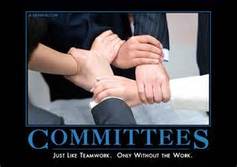
Unfortunately, Board committees aren't quite as measured in their operation. In fact, one of the greatest dangers to the smooth sailing of the Board and school can be the impulsive and often capricious operation of some of its own committees. In essence, the problem is this, whereas the Board as a whole understands its strategic and fiduciary role and stays deliberately away from administrative decision-making, small groups of Board members, on key committees, can often steer the direction of operations in radically new directions.
How can this happen when committees are ultimately creatures of the larger Board?
The answer is a simple one. All a committee, or Board, needs to do is to violate one or more of Carver's three principles of committee creation and operation: Minimalism (the fewer committees the better); Non-interference (to not compromise the clear accountability linkage between the Head and the Board); and Holism (to disturb the unity of the Board as little as possible). [John Carver, Boards that Make a Difference]
Over the next couple of posts I want to take a look at some of these principles, what they mean and how a Board can get off course.
Minimalism
Most schools have a number of Standing Committees (e.g. Finance, Property, Development, Governance, etc.) that perform an oversight function with regard to the administrative operations of the school. Although such committees can be quite valuable to ensure that Boards exercise their Duty of Care, others that emerge (Programme, Evaluation, Staffing, Budget, etc.) clearly encroach into management areas that are best left to the professional staff. Boards often create committees in order to more fully engage their members. Commitment to a small focused group with a specific mandate can often be more rewarding than merely showing up seven or eight times a year to listen to reports. In addition, for many Boards, this is also a great way to "test drive" new potential Board members. Once the Chair or the Governance Committee sees how they perform on a Board committee, it is usually easy to project their value to the Board as a whole.
These are both laudable goals. However, they can lead to a proliferation of committees to make certain that everyone has something to do and the result may be, at best, an increase in workload for the professional staff - especially the Head - in order to keep the committee busy and organized; or, at worst, a group of Board members searching for a purpose that begins to muck around in operational and personnel issues. It is this danger, what one Governance Chair called "rogue committees", referring to one of her own overstepping groups, that can seriously undermine the relationship between the Board and the Head.
One way to avoid this problem is to have as few Standing Committees as possible. In addition to those few with on-going responsibilities (like Finance and Governance); each year the Board should create a few ad hoc committees tasked with a very specific mandate and timeline. Once the task is completed, the committee should disband rather than look for its next job. Most Board members that I have spoken with would prefer this model. They are busy people who would prefer a committee to be task focused, and finite in its mandate rather that left with a vague, open-ended job to do.
Violation of the Principle of Minimalism is the beginning of the slippery slope that leads to the abyss of operational interference and Board disunity. More about that, next post.

 RSS Feed
RSS Feed